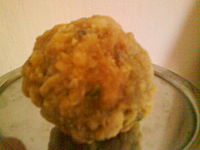- Prasad
-
For other uses, see Prasad (disambiguation).
Prasād (Sanskrit:प्रसाद, Bengali : প্রসাদ, Marathi:प्रसाद, Hindi/Urdu:प्रशाद/پرشاد/prashad, Kannada:prasādaಪ್ರಸಾದ, Gujarati:પૃસાદ Tamil "பிரசாதம்" and Malayalam:പ്രസാദം prasādam, Punjabi : ਪ੍ਰਸਾਦਿ, Telugu: Telugu: ప్రసాదం prasadam, Bhojpuri: persādi) is a mental condition of generosity, as well as a material substance that is first offered to a deity (in Hinduism) and then consumed.[1]
Literally, a gracious gift. Anything, usually edible, given by a saint, Perfect Master or the Avatar to their followers. Anything, usually edible, that is first offered to a deity, saint, Perfect Master or the Avatar and then distributed in His name.[2] The prasad has the deity's blessing residing within it. In contemporary Hindu religious practice in India, the desire to get prasada and have darshan are the two major motivations of pilgrimage and temple visits.[citation needed]
Laddu - given as prasad
As a mental condition, prasāda has a rich history of meanings in the Sanskrit tradition from Vedic literature onwards. In this textual tradition, prasada is a mental state experienced by gods, sages, and other powerful beings which is marked by spontaneous generosity and the bestowing of boons. Prasāda is understood in this sense of a mental state from the earliest literature (Rig Veda) onwards—not as an aspect of ritual practice. In later texts such as the Shiva Purāna, references to prasada as a material substance begins to appear alongside this older meaning.[citation needed]
In its material sense, prasada is created by a process of giving and receiving between a human devotee and the divine god. For example, a devotee makes an offering of a material substance such as flowers, fruits, or sweets—which is called naivedya. The deity then 'enjoys' or tastes a bit of the offering, which is then temporarily known as bhogya. This now-divinely invested substance is called prasāda, and is received by the devotee to be ingested, worn, etc. It may be the same material that was originally offered, or material offered by others and then re-distributed to other devotees. In many temples, several kinds of prasada (e.g. nuts, sweets) are distributed to the devotees.
Some strict Gaudiya Vaishnavas, most commonly initiated ISKCON devotees, will eat only prasada, i.e. everything they eat is first offered to Lord Krishna, not simply a few items like most other Hindus do. Their beliefs proscribe offering non-vegetarian items as well as onions, garlic and mushrooms to Krishna.[citation needed] In addition, the cooking of prasada is done not for their own consumption, but to offer to Krishna - they will receive the remnants of Krishna's food (which they consider to be non-different to Krishna). ISKCON temples are known for providing free prasada meals to all who come, as they believe that this is not only feeding the poor but providing them with Krishna's mercy as well.[3]
See also
References
- ^ Glossary of Sanskrit Terms in Integral Yoga Literature
- ^ Natu, Bal; "Glimpses of the God-Man, Meher Baba", Sheriar Press, 1987
- ^ Bhagavad-Gita 3:13, 9:27
External links
- Hindu Sanskrit Dictionary
- Prasada-yoga
- Prasadam Ontology A Vaishnava view
- Recipe for Satyanarayan Puja Prasad
Categories:- Objects used in Hindu worship
- Puja (Hinduism)
- Sikh practices
- Religious food and drink
- Sanskrit words and phrases
- Hinduism stubs
Wikimedia Foundation. 2010.


